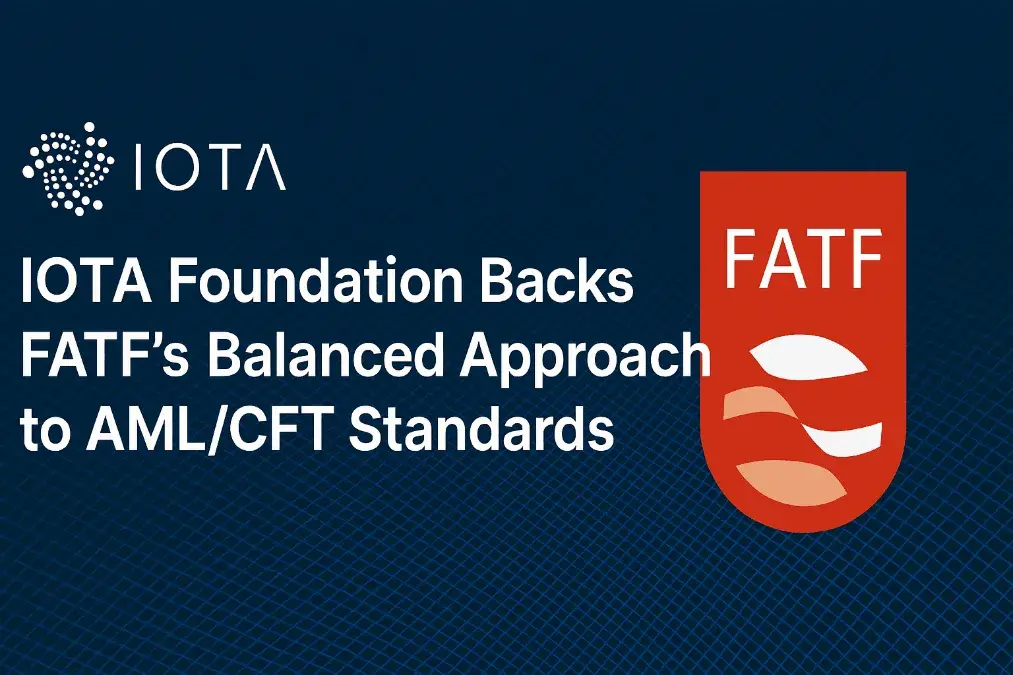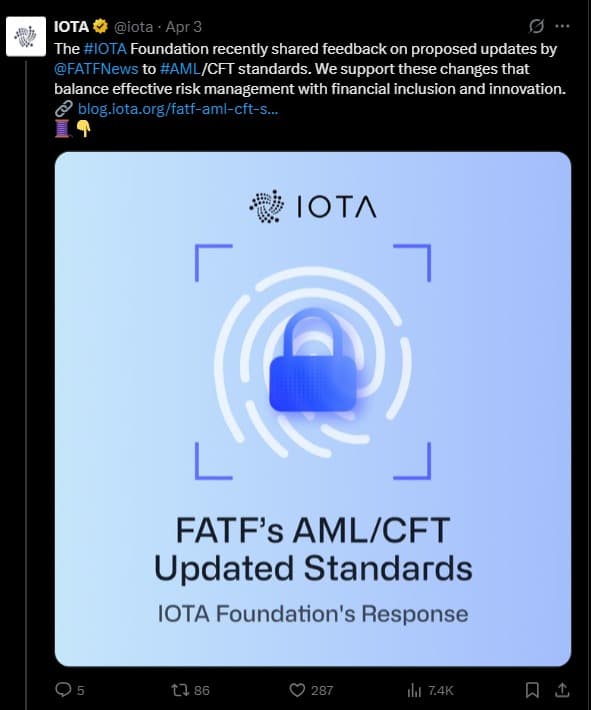IOTA Foundation Backs FATF’s Balanced Approach to AML/CFT Standards

CryptoQuorum
The IOTA Foundation has publicly announced its strong support for the recent revisions proposed by the Financial Action Task Force (FATF) concerning its “Anti-Money Laundering (AML) and Combating the Financing of Terrorism (CFT) standards.” This updated framework aims to strike a crucial balance between robust risk management and the imperative of financial inclusion, a principle the IOTA Foundation champions.
In a detailed statement, the IOTA Foundation articulated its belief that FATF’s proposed review represents a significant step forward in fostering a more pragmatic and effective regulatory landscape for the digital asset space and beyond. The foundation highlighted several key aspects of the revisions, emphasizing their potential to enhance clarity, simplify compliance, and promote innovation without compromising the fundamental goals of AML and CFT.

Proportionate Risk-Based Regulations: A Welcome Shift
One of the central tenets of the IOTA Foundation‘s support lies in FATF’s proposed shift towards “proportionate” risk-based regulations. The current language employs the term “commensurate,” and while seemingly a minor semantic alteration, the IOTA Foundation argues that the transition to “proportionate” carries significant implications for regulatory clarity and application.
According to the IOTA Foundation, this change signals a move towards a more nuanced understanding of risk management. “Proportionate” inherently suggests a calibration of regulatory measures that are appropriately scaled to the specific risks identified. This contrasts with “commensurate,” which can sometimes be interpreted as requiring a more uniform or potentially overly burdensome approach, regardless of the actual level of risk involved.
The IOTA Foundation believes that this emphasis on proportionality will empower regulatory bodies to implement more targeted and effective AML/CFT controls. By allowing for a more granular assessment of risk, financial institutions and other obliged entities can tailor their compliance efforts to the specific threats they face, avoiding the application of blanket measures that may stifle innovation and disproportionately impact lower-risk activities.
Encouraging Supervisory Review and Effective Risk Mitigation
Furthermore, the IOTA Foundation welcomes FATF’s proposal to encourage a “supervisory review of risk mitigation measures.” This aspect of the revision underscores the importance of ongoing evaluation and adaptation of risk management strategies. The IOTA Foundation posits that this focus will incentivize financial institutions to not only implement risk management frameworks but also to continuously assess their effectiveness and make necessary adjustments in response to evolving threats and technological advancements.
The IOTA Foundation believes that this proactive approach to supervision is crucial for ensuring that AML/CFT measures remain relevant and impactful. By encouraging a dynamic and iterative process of risk mitigation, FATF is fostering a more resilient and adaptable financial ecosystem capable of effectively addressing the evolving challenges of financial crime.
Moreover, the IOTA Foundation highlights the potential of this proposal to ensure that financial institutions effectively integrate risk management strategies into their core operations. Rather than viewing AML/CFT compliance as a separate or add-on function, the revised standards encourage a holistic approach where risk considerations are embedded within business processes and decision-making.
Simplified Compliance Measures: Fostering Innovation
A key area of alignment between the IOTA Foundation and FATF’s proposed revisions is the emphasis on enabling simplified compliance measures, particularly in lower-risk scenarios. The IOTA Foundation strongly advocates for reducing unnecessary regulatory hurdles that can impede innovation and disproportionately burden smaller entities and startups.
The IOTA Foundation firmly believes that a risk-based approach should naturally lead to lighter-touch compliance requirements for activities and entities that present a demonstrably lower risk of money laundering or terrorist financing. By reducing the barriers to entry, these simplified measures can empower startups to develop novel business models and introduce innovative financial services without being stifled by overly complex and resource-intensive regulatory obligations.
This focus on simplified compliance, according to the IOTA Foundation, will ultimately foster greater growth and competition within the financial sector. By leveling the playing field and allowing new entrants to thrive, the revised FATF standards can contribute to a more dynamic and inclusive financial landscape.
Non-Face-to-Face Interactions and Digital Identity
The IOTA Foundation also specifically commented on FATF’s proposal regarding non-face-to-face interactions. The current regulatory landscape often treats remote transactions as inherently higher risk, which can create unnecessary friction and limitations for digital financial services.
The IOTA Foundation argues that significant advancements in digital identity solutions have fundamentally altered the risk profile of remote transactions. Sophisticated identity verification technologies and secure digital authentication methods now provide robust safeguards in non-face-to-face environments. Therefore, the IOTA Foundation contends that it is no longer appropriate to automatically categorize all remote transactions as high risk.
The IOTA Foundation views this section of the FATF review as a positive and necessary step towards enhancing accessibility to financial services. By recognizing the capabilities of modern digital identity solutions, the revised standards can facilitate greater financial inclusion while maintaining robust AML/CFT controls. This is particularly important in an increasingly digital world where remote access to financial services is becoming the norm.
Exploring Industry-Specific Solutions and Privacy
Beyond the already recognized changes, the IOTA Foundation has proactively proposed that FATF consider the further exploration of industry-specific solutions within the AML/CFT framework. The IOTA Foundation believes that a more tailored approach, taking into account the unique characteristics and risk profiles of different sectors, can lead to more effective and efficient regulatory outcomes.
A key consideration in this context, according to the IOTA Foundation, is the need to balance regulatory compliance with the fundamental right to user privacy. The IOTA Foundation argues that industry-specific solutions can be designed in a way that achieves AML/CFT objectives while minimizing the collection and retention of sensitive personal data.
Tokenized KYC Proofs: A Privacy-Preserving Approach
To illustrate the potential of industry-specific solutions, the IOTA Foundation highlighted its own work in the area of tokenized Know Your Customer (KYC) proofs. A notable example is the KYC solution developed by the IOTA Foundation within the European Blockchain Regulatory Sandbox.
This innovative framework leverages the principles of self-sovereign identity and blockchain technology to provide a scalable, secure, and privacy-preserving method for regulatory compliance in decentralized finance (DeFi) transactions. Tokenized KYC proofs allow users to securely store and selectively share their verified identity information, reducing the need for repeated KYC processes and minimizing the exposure of sensitive data.
The IOTA Foundation believes that solutions like its tokenized KYC framework demonstrate how technology can be harnessed to achieve both robust regulatory compliance and enhanced user privacy. By exploring and encouraging the development of such industry-specific tools, FATF can foster a more responsible and user-centric approach to AML/CFT in the digital age.
Stay informed, read the latest crypto news in real time!
Commitment to Collaboration and Dialogue
Concluding its submission, the IOTA Foundation extended an open invitation to FATF and other industry stakeholders to engage in an extensive discussion on these critical topics. The IOTA Foundation reiterated its strong commitment to actively participating in regulatory reviews and deliberations that have a significant impact on the financial ecosystem.
The IOTA Foundation believes that ongoing dialogue and collaboration between regulators, industry participants, and technology providers are essential for developing effective and balanced AML/CFT standards that can keep pace with the rapid advancements in financial technology while safeguarding the integrity of the financial system.
The IOTA Foundation‘s proactive engagement with FATF underscores its commitment to responsible innovation and its belief that a well-defined and appropriately calibrated regulatory framework is crucial for the long-term success and mainstream adoption of distributed ledger technologies and digital assets. By supporting FATF’s move towards proportionate, risk-based regulations and advocating for simplified compliance measures and privacy-preserving solutions, the IOTA Foundation is actively contributing to the development of a more inclusive, secure, and innovative financial future.





One thought on “IOTA Foundation Backs FATF’s Balanced Approach to AML/CFT Standards”